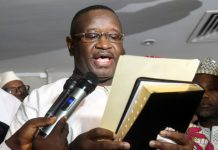In Nigeria, Information Communication Technology, ICT, can be deployed to the campaign against corruption as well as to explore the options in economic diversification. ICT can enhance government productivity by contributing to the monitoring and tracking of information in real time and allowing better decision-making.
Nigeria boasts of a tech-savvy and young population. The need to support the country’s young entrepreneurs ought to be reflected in the ICT sector. It is generally believed that Nigeria attracts more start-up funding than anywhere else in Africa. But as the experts say, ICT-driven businesses require ICT developments to survive. This explains why they recommend that the government needs to provide a more enabling environment through the liberalisation of key ICT sub-sectors such as broadband, managed services, software and blockchain, to create more competition and attract foreign investment.
This must be driven by consistent, deliberate and long-term policies and most importantly, through investment in education. Proponents of an ICT University in the country are increasing but the institutions of Science and Technology can easily veer to setting up special ICT Departments that will appeal to younger generations.
The experts say that ICT washes on the Nigerian society from two major standpoints: education and economy. According to them, ICT on education ensures lifelong learning through e-learning and builds the right skill to explore economic opportunities. On economy, ICT has impacted healthcare, agriculture, services, tourism while creating opportunities for diverse forms of investment through digital market, improved productivity and quality and the revolution of the Nigerian banking and financial sector.
At a recent forum on this issue in Lagos, the former NITEL Chairman and Director-General of the Nigerian Television Authority, NTA, Mr. Vincent Maduka, focused on the Convergence of ICT and Media towards Achieving a Digitalized Nigeria. Mr. Maduka went down memory lane by looking at the origin of the Federal Ministry of Communications and measured the developments and setbacks Nigeria had experienced in the build up to achieving a digital society. He looked at the role of the media in setting the agenda and influencing the drive for an improved ICT-based nation. He pointed out that greater effort should be made to enable Nigeria rank among leading countries in the ICT sector given the enormous prospects the country has.
Experts are of the view that for Nigeria’s economy to become digital, ICT would be strategically deployed to drive productivity and efficiency in all sectors of the economy. Currently, almost all sectors of the The Nigerian economy relies on ICT to increase efficiency, productivity and performance which enables the sector to contribute over 10% of the nation’s GDP. The experts are yet to determine how ICT should be used to foster growth in order to contribute more to Nigeria’s economic and social development. In the lay man’s parlance, the trick is to see how ICT can make Nigeria the economic hub in Africa.


















